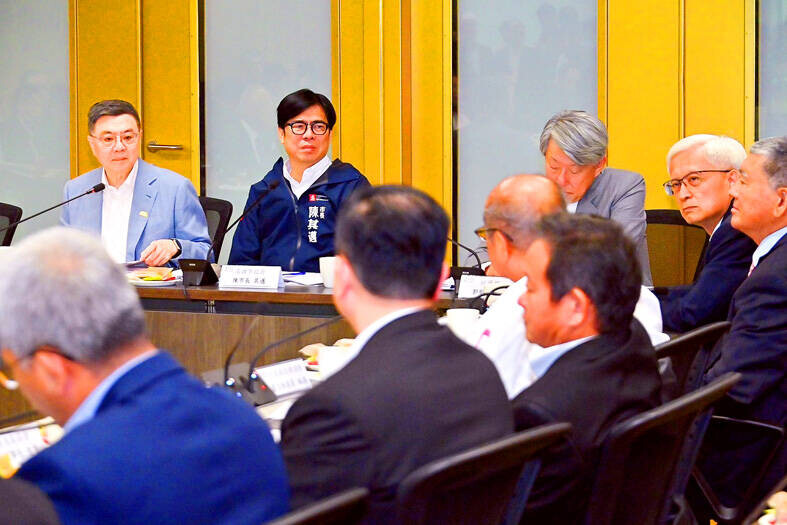
Yesterday, Taiwan Premier Cho Jung-tai emphasized that "Made in Taiwan (MIT) products must genuinely be manufactured in Taiwan," vowing a strong crackdown on origin laundering and the initiation of anti-dumping investigations to prevent the dumping of Chinese products within Taiwan.
Premier Cho made these remarks during a meeting with representatives from the industrial sector in the Kaohsiung area.
In response to the recent announcement by the U.S. government regarding the imposition of "reciprocal" tariffs on its trade partners, President Lai Ching-te and Premier Cho have been holding a series of meetings with national industry leaders since last week to gather opinions and discuss concerns.
According to Premier Cho, Taiwanese and U.S. officials discussed tariff issues via video conference last Friday evening, and both sides will continue negotiations based on the principle of mutual benefit.
Premier Cho pointed out that the United States has expressed deep concerns not only about "reciprocal" tariffs and non-tariff barriers but also about the issue of "origin laundering." "Origin laundering" refers to the deceptive practice of falsely labeling the country of origin of a product to evade tariffs or trade regulations.
Premier Cho stressed, "Therefore, MIT must be MIT," adding, "Taiwan must firmly guard its defense line and not become a loophole."
To address this issue, the government announced it would strengthen a three-pronged defense strategy: enhanced pre-emptive measures, strengthened inspections, and strict penalties for violators.
Premier Cho urged Taiwan to remain vigilant so as not to become a victim of origin laundering, and he called on businesses to cooperate closely with the government to protect national economic security. He emphasized that strengthening regulatory compliance and transparency is key to gaining greater trust and support from international partners amid the reshaping of the global trade order.
Premier Cho warned of the risk of Chinese products being dumped in other markets at low prices following the U.S.'s decision to increase tariffs on Chinese imports by 145%. He added that the government would initiate anti-dumping investigations to protect the competitiveness of domestic industries and ensure the safety of consumer products.
Premier Cho mentioned that Taiwan, as a leader in the high-tech sector, exports a wide range of sensitive advanced technology products. He stated that export controls play a crucial role in global economic security and that Taiwan must do its best in export control to assert its legitimate rights in negotiations with the United States.
Regarding non-tariff barriers, Premier Cho added that the government and the legislature will carefully discuss and thoroughly review which barriers can be dismantled, adhering to the principles of "protecting national food safety and maintaining order in the trade market."
Meanwhile, during a separate meeting yesterday with peanut producers and merchants in Pingtung County, Premier Cho announced a one-week postponement of the announcement of the detailed content of an NT$88 billion (approximately US$2.72 billion) support package aimed at mitigating the impact of U.S. tariff increases on Taiwanese products.
Premier Cho explained that due to the uncertainty of the U.S.'s position, relevant ministries and agencies need more time to finalize the details of the support package, including subsidy allocation plans for various industries.
Officials from Washington and Taipei began discussions on "reciprocal" tariffs via video conference last Friday. The "reciprocal" tariff rate to be imposed on Taiwan is 32%, higher than that of neighboring countries such as Japan (24%) and South Korea (expected to be 25%).
Additional Background Information:
Seriousness of Origin Laundering: Origin laundering goes beyond simple tariff evasion; it undermines fair trade practices between nations, provides false information to consumers, and ultimately weakens the industrial competitiveness of the affected country. The tendency for origin laundering attempts increases particularly when import regulations on products from specific countries are strengthened for political or economic reasons.
Importance of Anti-dumping Investigations: Dumping refers to the act of a country exporting products below their normal value to protect its domestic industry or expand market share, thereby harming the importing country's industry. Anti-dumping investigations examine the damage caused by such dumping practices, and if dumping is confirmed, anti-dumping duties can be imposed on the products to protect domestic industries.
International Significance of Export Controls: Export control regulates the outflow of strategic materials, technologies, software, etc., with the aim of national security, maintaining international peace and security, and preventing terrorism. Especially in the high-tech sector, export control is used not only to prevent technology leakage but also as an important means to enhance international negotiating power.
U.S. "Reciprocal" Trade Policy: "Reciprocal" trade policy demands the same level of access to foreign markets as is granted to those markets in the domestic market. The U.S. has recently strengthened this stance towards major trade partners. While it can be used as a means of pressure against unfair trade practices of specific countries, it can also escalate global trade tensions.
Taiwan's Economic Situation and the Impact of U.S. Tariffs: Taiwan possesses strong competitiveness in advanced technology sectors, particularly in the semiconductor industry, and the United States is one of Taiwan's important trading partners. High tariffs imposed by the U.S. could negatively impact Taiwan's related industry exports, necessitating proactive government responses.
Premier Cho Jung-tai's strong expression of will is interpreted as part of Taiwan's efforts to pursue fair competition in the international trade order, protect its domestic industries, and further secure a leading position in trade negotiations. Concrete policy implementation by the government, along with active cooperation from relevant businesses, will be crucial at this juncture.
[Copyright (c) Global Economic Times. All Rights Reserved.]






























